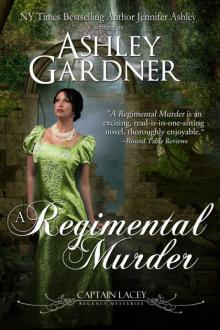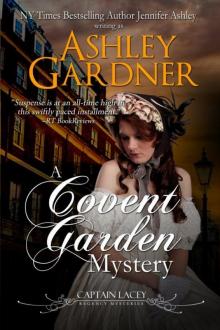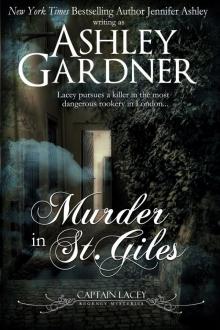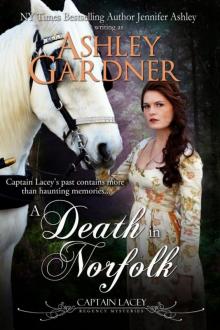- Home
- Jennifer Ashley
Murder in St. Giles
Murder in St. Giles Read online
Murder in St. Giles
Captain Lacey Regency Mysteries, Book 13
Ashley Gardner
Jennifer Ashley
JA / AG Publishing
Contents
Chapter 1
Chapter 2
Chapter 3
Chapter 4
Chapter 5
Chapter 6
Chapter 7
Chapter 8
Chapter 9
Chapter 10
Chapter 11
Chapter 12
Chapter 13
Chapter 14
Chapter 15
Chapter 16
Chapter 17
Chapter 18
Chapter 19
Chapter 20
Chapter 21
Chapter 22
Chapter 23
Chapter 24
Chapter 25
Chapter 26
Chapter 27
Chapter 28
Chapter 29
Chapter 30
Author’s Note
Also by Ashley Gardner
About the Author
Copyright
Chapter 1
London, 1819
I entered the house on South Audley Street one early April morning to hear my wife shouting.
I paused in disquiet. My wife—Donata, the former Lady Breckenridge—shouted at no one but me. Indeed, she enjoyed our occasional spirited quarrels, her voice rising in volume to match mine.
With all other mortals, she was as cool as a winter icicle. Any who displeased her were shown the door by Barnstable, her equally cool butler.
That her voice rang down from the upper floors, this early in the day—I was returning from my morning ride—worried me greatly.
“Who the devil is here?” I asked Barnstable, who’d come off the stairs as a footman took my hat. My concern was mirrored in Barnstable’s brown eyes.
“Her cousins, sir,” Barnstable said. “That is, Mr. St. John, a cousin of the late Lord Breckenridge, and Mr. Phillips, the cousin of her ladyship. They arrived shortly after you departed. They came unannounced,” he finished in a chilly tone.
Timed well, then. They’d meant to corner Donata alone.
I tossed my coat over the footman’s arm as I moved to the stairs. “A pity I decided to return early,” I said, and I saw a gleam of satisfaction in Barnstable’s eyes.
He stepped aside as I made my way up the staircase to the first floor of our elegant home. Though I was technically the man of the house, as had been Lord Breckenridge before me, this abode showed Donata’s touch, her hand, her personality. Its male inhabitants only lived here.
I heard my wife’s voice coming from a reception room tucked behind the stairs, a chamber in which guests waited before being shown into the grand drawing room in the front of the house. Her reception room was more comfortable than most, with soft chairs, pleasant paintings of flowers, and a few books left about for her waiting callers.
However, Donata coming to the reception room to see these cousins instead of having Barnstable or a footman show them into the drawing room spoke loudly of her disapprobation. She likely hadn’t felt she could turn away her kin, but she could make certain they knew they weren’t welcome.
I opened the door without knocking—I lived here after all—in time to hear Donata say, “If either of you touch him, I will shoot you.”
“Now,” came a voice that chilled me. “Don’t be unreasonable, woman. You know his father wanted this.”
“Then he’d have said so in his will. I read every word of that document, and it mentioned nothing of giving him to you.”
“Donata.” The thinner voice of the pair spoke placatingly. “St. John is only looking after your happiness.”
“Happiness?” Donata spat the word. “You do not have any—”
I cut through her fury by putting myself between her and the two men facing her. I gave them my best regimental captain glare.
“Explain, sirs, why you have forced your way into our house and are badgering my wife.”
The reedy-voiced gentleman was Edwin Phillips, Donata’s cousin, son of her father’s sister. He had dark hair receding far up his forehead, though he was only thirty, and watchful blue eyes in a narrow face. He’d wanted to marry Donata and hated me for cutting him out. Not that she’d had any intention of accepting him.
The second man was unknown to me, and it was his voice that had unnerved me so. The sound of it was very close to that of the late Lord Breckenridge, Donata’s unlamented husband.
The man resembled Breckenridge as well, large and thick of body but tall, and only some of that thickness was fat. He had a broad face, sharp nose, and flat brown eyes. Like Breckenridge, he had little hair on top of his head but a thickness of it in the back. He sported full sideburns that had been trimmed to halt just shy of his jaw.
I hadn’t met this man in the year I’d been married to Donata, and she rarely spoke of the Breckenridge side of the family. She’d told me about the two gentlemen she called Romulus and Remus, who were first cousins to her son, Peter, but I had seen them at a distance, and this gentleman was neither of those.
The Breckenridge cousin turned a cold eye to me. “This is not your business, sir.”
He expected me to grovel before my betters, I could see. I rarely groveled, however, and I did not consider the cousin of a peer to be my better.
“Mrs. Lacey is my wife, and therefore it is my business,” I stated.
Donata stepped beside me. She did not look at me, but I sensed her gratitude that I hadn’t simply closed the door and left her to it, nor immediately knocked the two men to the carpet.
“Cousin Edwin and Cousin Stanton believe that Peter will be better off living in Somerset with the St. John family,” she said coldly. “I am certain that would only be a short stay before Stanton moves into the Breckenridge estate to ensure that all is well for Peter to take over at his majority.” Her voice cut like a whiplash, but the dark curls that trickled to her shoulders trembled.
A chill cut through my anger. This man, Stanton St. John, was several places removed from inheriting the viscountcy, but life was uncertain, and Romulus and Remus, the two rakehell cousins between him and Peter, could any time expire from disease, dissipation, drink, or wrecking their phaetons racing to Brighton.
Peter, Donata’s son from her first marriage, was seven years old. While Peter was robust, many children did not live to see adulthood, a fact that had Donata keeping Peter close to home or well guarded by her parents in Oxfordshire.
I could see in Stanton’s eyes the frustration about the gap between him and the Breckenridge fortune and title—a gap filled by two fops and a little boy. But if Peter were to fall from a horse while galloping across the Breckenridge lands … Well then, one less person in his way.
I let my gaze harden. Stanton stared right back at me, knowing I understood him. But I also caught a hint of smugness, a look that said I would not have the last word in this debate.
“This house is Mrs. Lacey’s to use for her lifetime,” I said. “According to the settlements made by her husband.”
“Yes,” Stanton admitted reluctantly. His eyes darted to the fine paintings on the walls and the silver objet d’art, his look covetous.
“As mistress of the house, she can admit or deny whomever she wishes,” I went on. “As her husband, I can also say who enters and whom the butler should eject. In other words, gentlemen, you may take your leave. Now, if you please.”
I noted no argument from the woman standing next to me. Her jaw was rigid, her dark blue eyes tight.
She made a stiff nod to her cousins. “Good day, gentlemen.”
“Now, Donata,” her cousin Edwin began. “He means only
the best for young Peter.”
“Good day,” Donata repeated, a bit more firmly. “Barnstable will show you out.”
With that, she turned her back on them and glided from the room. The door opened for her, one of her footmen always ready. My wife never touched a door handle in her own house if she did not wish it.
Donata walked with her head high, her step even and dignified. The discreet footman shut the door but not all the way—the latch did not catch.
This left me alone with Donata’s male relatives, neither of whom liked me. Edwin had made it immediately clear how put out he was because Donata had chosen to marry me. He’d imagined himself as stepfather to a viscount and son-in-law to an earl.
Though I’d never met Stanton St. John, his dislike for me wafted from him like cloying perfume. While I had no legal power over Peter, I did have influence, and I now considered myself his father. I could see in the back of Stanton’s dark eyes how much that rankled.
“Captain Lacey,” Edwin said. “Surely you can understand that Mr. St. John is correct. The place for Peter is with his family.”
“I must wonder how you stand to gain from this,” I returned bluntly. “If Peter lives with Mr. St. John, surely that puts him out of your reach.”
Edwin’s cheeks went scarlet. I wondered whether Stanton had offered him money or perhaps access to Peter if he helped with his petition. Their idea, I supposed, was that Peter would grow dependent upon his two cousins and be manipulated into granting them favors—gifts, position, power—in gratitude.
I read this in Edwin’s flush, though Stanton looked flinty. I had to wonder how quickly Stanton would cut Edwin out of the bargain.
I leaned on my walking stick. “I have a rather large valet who aspires to be a pugilist,” I said. “And another man who styles himself as my guard, who actually was a pugilist. I can call them to help me show you the door if you wish. One is young and vigorous, the other quite a skilled fighter. Within this house, they answer only to me.”
Edwin looked worried, but Stanton’s scowl deepened. “Keep your dogs contained,” he said. “It will make no difference whether I am admitted to the house or not, Captain. Lady Breckenridge will receive letters about the matter, as I am certain she realizes. Good morning.”
I stepped aside as he strode to the door, which silently swung wide for him. Bartholomew, the tall, well-muscled young man I’d threatened him with, was on the other side.
Bartholomew glanced at me, his eagerness unmistakable—he had pitched unwanted visitors to the pavement before. I gave my head the slightest shake, and Bartholomew withdrew, looking disappointed.
Edwin hastened after Stanton. I followed him, Bartholomew silently falling into step behind me.
When Stanton reached the bottom of the stairs, a footman handed him his coat, another positioning himself with Edwin’s. Barnstable, stationed at the front door, gave them his butler’s bow.
“Good day, gentlemen,” he said.
A carriage had already halted at the doorstep. Stanton climbed into it, barely waiting for Edwin to more clumsily ascend before the coach jerked forward.
Barnstable closed the front door. He looked up at me standing on the first landing, inquiring without words if he could assist.
I shook my head, told Bartholomew to go about his business, and turned to seek Donata.
Before I could set foot on the next flight of stairs, a commotion sounded beneath me. I heard the imploring voice of a footman, shocked into dropping his trained tones—“’Ere. You ain’t allowed …”
A large man pushed his way past the servants trying to stop him emerging from the backstairs. He was Brewster, the former pugilist and thief who acted as my bodyguard, the second man I’d threatened Stanton with.
Brewster sent a grim look up to me. “You need to come, guv. My missus sent me to fetch you.”
Chapter 2
Is Mrs. Brewster all right?” I asked in alarm. I’d met Em Brewster several times now—she and Brewster lived in St. Giles, a corner of London rife with violence.
Brewster crushed his hat in his big hands, the only movement in his otherwise still body. His eyes betrayed his agitation, his face tight.
“Nothing wrong with her,” Brewster said. “Bloke’s been killed.”
The answer both brought me relief and more worry. Men were killed in London every day, unfortunately—in accidents, while fighting—but there must be a reason Mrs. Brewster had sent her husband across London to summon me about this one.
“Damnation.” I glanced up the stairs where Donata had fled. “Can you wait a moment?”
Brewster shook his head. “No, guv. I can’t.”
The blunt statement made me wonder still more, but I was not heartless enough to race away from Donata when the welfare of her son was at stake.
“Return to Mrs. Brewster,” I said firmly. “I will be there as soon as I am able.”
Before Brewster could object, I continued up the stairs.
I found Donata in her boudoir, at her window. Its pale draperies admitted light to touch the gold and white carpet, marble mantelpiece, brocade sofa and chaise, and paintings in gilded frames.
This feminine retreat had recently been invaded by masculinity in the form of my newspapers and a decanter of brandy, which reposed on a demi-lune table beneath a painting of a lavish country house, complete with horses.
Donata stood with her back to me, but I knew by the way she held herself that she’d heard me enter and close the door. Before I could think of words to ease her, she swung around, her eyes glittering with tears.
“They can do it, Gabriel. They can take Peter from me.”
“No,” I said at once.
Donata did not rush into my arms and beg for me to make everything better. She was not that sort of woman. She remained by the window, her face as pale as the curtains.
“Of course they can,” she said in a brittle voice. “A woman is not related to her own son, did you not know? I am only the vessel for the man’s seed. I believe that to be absolute nonsense, but it is the law.”
“Lord Breckenridge named you guardian, did he not?” I pointed out. “The wording of his will should prevail.”
Donata nodded glumly. “As awful as he was, even Breckenridge was wise enough not to trust his own family. Stanton is a greedy, foul man, and I never let Peter anywhere near him.”
“Then there will be nothing he can do. Breckenridge stated his wishes, and that is final.”
“Do not try to comfort me, Gabriel. You know Stanton could find an excellent solicitor—could use Breckenridge’s own solicitor—to find chinks in the will and overturn my guardianship. Perhaps he could not have when I was simply Breckenridge’s widow, but now that I’ve wed a nobody who married me to get his hands on the family silver, my judgment cannot be trusted.”
I did not grow offended—Donata only repeated the well-known gossip that circulated about me.
I apparently had charmed my way into Donata’s bedchamber so that I could take my ease, spend all her money, and influence her son into giving me a sinecure when he was older so I could continue my profligate life.
“You also have solicitors,” I said. “Some of the best in England, who will countermand anything Stanton can suggest. Take comfort in that, if you will not from me.”
Donata remained rigid. “And perhaps these excellent men of the law will advise me to do what Stanton wants. After all, a boy should be raised by gentlemen, not soft women. Peter’s first cousins are far too reckless, of course, but second cousin Stanton is older and more dependable. My solicitors did not think me wise to marry you, Gabriel—I had to persuade them I wouldn’t do anything so foolish as give you all my income before they’d grudgingly set up an allowance for you.”
The extent of the money that trickled to me for clothing and sundries made me a bit nonplussed, but I made myself feel better by being frugal with it.
I went to her but did not reach for her. “Sending Peter off with a man who
so obviously wishes to control the viscountcy will not please your solicitors either, I think. I will not let it happen, Donata. Peter will remain with you—with us—and out of reach of your repugnant cousins.”
“I am pleased with your optimism,” she bit out. “Forgive me if I do not share it.” She jerked her attention behind me, her brows lowering to a scowl. “Yes, Bartholomew, what is it?”
Bartholomew, who had quietly opened the door, remained there, his tall body stiff in his dark suit. Donata was usually calm and polite with her servants, and Bartholomew blinked a moment at her waspish tone.
“Begging your pardon, my lady,” he said. “Captain. Mr. Brewster has planted himself at the foot of the stairs and refuses to move.”
Donata’s mouth pinched. “Has he come to fetch the captain for another mission Mr. Denis won’t soil his hands with?”
I answered. “Brewster’s wife wishes to speak with me. Trouble in St. Giles.”
“Is there?” Donata blinked back tears, reaching for her usual coolness. “Hardly surprising. You’d better go, Gabriel. Mrs. Brewster would not summon you for a trifle.” She pinned me with a sharp look. “But you will tell me every word of what you find when you return, no matter how sordid the tale.”
“Of course.” I gave her a bow. “I hope it is a trifle, and Brewster is making much of nothing.”
I spoke lightly, but I knew Brewster would not have rushed to me, tense and drawn, if the matter could be easily resolved.
Donata rose on tiptoe and kissed my cheek, her lips cold. “Godspeed,” she whispered.

 Grant
Grant Pride Mates
Pride Mates The Duke's Perfect Wife
The Duke's Perfect Wife Scandal Above Stairs
Scandal Above Stairs White Tiger
White Tiger Midnight Wolf
Midnight Wolf Rules for a Proper Governess
Rules for a Proper Governess Wild Wolf
Wild Wolf Bad Wolf
Bad Wolf Lion Eyes
Lion Eyes Murder in Grosvenor Square
Murder in Grosvenor Square The Untamed MacKenzie
The Untamed MacKenzie Wicked Deeds of Daniel Mackenzie
Wicked Deeds of Daniel Mackenzie Tiger Striped_Shifters Unbound
Tiger Striped_Shifters Unbound Murder Most Historical
Murder Most Historical Shifter Made
Shifter Made Mate Bond
Mate Bond Tiger Striped
Tiger Striped Bodyguard
Bodyguard Guardian's Mate
Guardian's Mate From Jennifer Ashley, With Love
From Jennifer Ashley, With Love The Longest Night
The Longest Night The Stolen Mackenzie Bride
The Stolen Mackenzie Bride The Sudbury School Murders
The Sudbury School Murders The Care & Feeding of Pirates
The Care & Feeding of Pirates The Hanover Square Affair
The Hanover Square Affair Death Below Stairs
Death Below Stairs Wild Things
Wild Things Wild Cat
Wild Cat The Gentleman's Walking Stick
The Gentleman's Walking Stick A Regimental Murder
A Regimental Murder Lone Wolf
Lone Wolf Forbidden Taste
Forbidden Taste Red Wolf
Red Wolf The Madness of Lord Ian Mackenzie
The Madness of Lord Ian Mackenzie A Covent Garden Mystery
A Covent Garden Mystery The Pirate Next Door
The Pirate Next Door Past Crimes: A Compendium of Historical Mysteries
Past Crimes: A Compendium of Historical Mysteries Highlander Ever After
Highlander Ever After The Alexandria Affair
The Alexandria Affair A Shifter Christmas Carol
A Shifter Christmas Carol The Devilish Lord Will
The Devilish Lord Will Adam
Adam Kyle (Riding Hard Book 6)
Kyle (Riding Hard Book 6) A Body in Berkeley Square
A Body in Berkeley Square The Mad, Bad Duke
The Mad, Bad Duke Mate Claimed
Mate Claimed A Mackenzie Clan Christmas
A Mackenzie Clan Christmas The Seduction of Elliot McBride
The Seduction of Elliot McBride The Glass House
The Glass House Iron Master (Shifters Unbound Book 12)
Iron Master (Shifters Unbound Book 12) A Mackenzie Family Christmas: The Perfect Gift
A Mackenzie Family Christmas: The Perfect Gift Scandal Above Stairs_A Below Stairs Mystery
Scandal Above Stairs_A Below Stairs Mystery Perfect Mate
Perfect Mate Murder in the East End
Murder in the East End Snowbound in Starlight Bend
Snowbound in Starlight Bend Hard Mated
Hard Mated Murder in St. Giles
Murder in St. Giles Alec Mackenzie's Art of Seduction
Alec Mackenzie's Art of Seduction A MacKenzie Clan Gathering
A MacKenzie Clan Gathering Tyler
Tyler Lady Isabella's Scandalous Marriage
Lady Isabella's Scandalous Marriage Duke in Search of a Duchess: Sweet Regency Romance
Duke in Search of a Duchess: Sweet Regency Romance A Death in Norfolk
A Death in Norfolk Give Me One Night (McLaughlin Brothers Book 4)
Give Me One Night (McLaughlin Brothers Book 4) Iron Master
Iron Master The Many Sins of Lord Cameron
The Many Sins of Lord Cameron A Disappearance in Drury Lane
A Disappearance in Drury Lane Never Say Never (McLaughlin Brothers Book 3)
Never Say Never (McLaughlin Brothers Book 3) Death in Kew Gardens
Death in Kew Gardens Ross: Riding Hard, Book 5
Ross: Riding Hard, Book 5 Ray: Riding Hard
Ray: Riding Hard A Soupçon of Poison
A Soupçon of Poison Tiger Magic
Tiger Magic The Pirate Hunter's Lady
The Pirate Hunter's Lady A Mystery at Carlton House
A Mystery at Carlton House The Necklace Affair
The Necklace Affair Wolf Hunt
Wolf Hunt Scandal and the Duchess
Scandal and the Duchess Kyle
Kyle Why Don't You Stay? ... Forever (McLaughlin Brothers Book 2)
Why Don't You Stay? ... Forever (McLaughlin Brothers Book 2) Bear Attraction
Bear Attraction The Gathering
The Gathering A Mackenzie Yuletide
A Mackenzie Yuletide Wild Things (Shifters Unbound #7.75)
Wild Things (Shifters Unbound #7.75) The Redeeming
The Redeeming The Seduction of Elliot McBride hp-5
The Seduction of Elliot McBride hp-5 Death at the Crystal Palace
Death at the Crystal Palace Mackenzie Family Christmas: The Perfect Gift (highland pleasures)
Mackenzie Family Christmas: The Perfect Gift (highland pleasures) Forbidden Taste: A Vampire Romance (Immortals)
Forbidden Taste: A Vampire Romance (Immortals) Care and Feeding of Pirates
Care and Feeding of Pirates Shifter Made (shifters unbound)
Shifter Made (shifters unbound) Dark and Dangerous: Six-in-One Hot Paranormal Romances
Dark and Dangerous: Six-in-One Hot Paranormal Romances The Duke’s Perfect Wife hp-4
The Duke’s Perfect Wife hp-4 The Seduction of Elliot McBride (Mackenzies Series)
The Seduction of Elliot McBride (Mackenzies Series) Lady Isabella's Scandalous Marriage hp-2
Lady Isabella's Scandalous Marriage hp-2 BodyGuard (Butterscotch Martini Shots Book 2)
BodyGuard (Butterscotch Martini Shots Book 2) The Wicked Deeds of Daniel Mackenzie hp-6
The Wicked Deeds of Daniel Mackenzie hp-6 Tiger Magic su-5
Tiger Magic su-5 The Madness Of Lord Ian Mackenzie hp-1
The Madness Of Lord Ian Mackenzie hp-1 Alec Mackenzie's Art of Seduction: Mackenzies (Mackenzies Series Book 9)
Alec Mackenzie's Art of Seduction: Mackenzies (Mackenzies Series Book 9) Mackenzie Family Christmas: The Perfect Gift
Mackenzie Family Christmas: The Perfect Gift Bodyguard (Shifters Unbound #2.5)
Bodyguard (Shifters Unbound #2.5) Midnight Wolf (A Shifters Unbound Novel)
Midnight Wolf (A Shifters Unbound Novel) White Tiger (A Shifter's Unbound Novel)
White Tiger (A Shifter's Unbound Novel) Cowboys Last All Night
Cowboys Last All Night Pride Mates su-1
Pride Mates su-1 Hard Mated (shifters unbound )
Hard Mated (shifters unbound ) Bodyguard (shifters unbound )
Bodyguard (shifters unbound ) Snowbound in Starlight Bend: A Riding Hard Novella
Snowbound in Starlight Bend: A Riding Hard Novella The Untamed Mackenzie (highland pleasures)
The Untamed Mackenzie (highland pleasures) The Untamed Mackenzie (Mackenzies Series)
The Untamed Mackenzie (Mackenzies Series)![Highland Pleasures [6] The Wicked Deeds of Daniel Mackenzie Read online](http://i1.bookreadfree.com/i2/04/07/highland_pleasures_6_the_wicked_deeds_of_daniel_mackenzie_preview.jpg) Highland Pleasures [6] The Wicked Deeds of Daniel Mackenzie
Highland Pleasures [6] The Wicked Deeds of Daniel Mackenzie Lone Wolf (shifters unbound)
Lone Wolf (shifters unbound)![Shifters Unbound [5] Tiger Magic Read online](http://i1.bookreadfree.com/i2/04/11/shifters_unbound_5_tiger_magic_preview.jpg) Shifters Unbound [5] Tiger Magic
Shifters Unbound [5] Tiger Magic Tyler (Riding Hard Book 4)
Tyler (Riding Hard Book 4) Ross
Ross Bad Boys of the Night: Eight Sizzling Paranormal Romances: Paranormal Romance Boxed Set
Bad Boys of the Night: Eight Sizzling Paranormal Romances: Paranormal Romance Boxed Set From Jennifer Ashley, With Love: Three Paranormal Romances from Bestselling Series
From Jennifer Ashley, With Love: Three Paranormal Romances from Bestselling Series The Longest Night: Fantasy Romance (Nvengaria Book 4)
The Longest Night: Fantasy Romance (Nvengaria Book 4) The Many Sins of Lord Cameron hp-3
The Many Sins of Lord Cameron hp-3 Mate Claimed su-4
Mate Claimed su-4